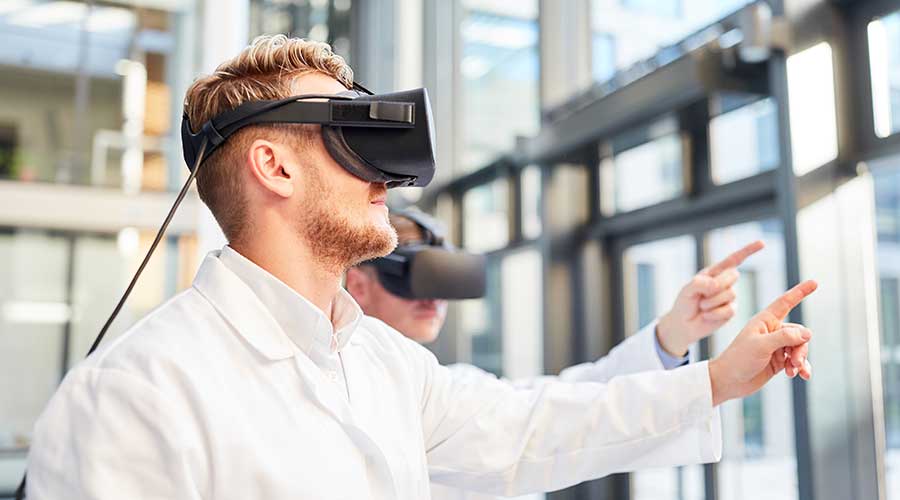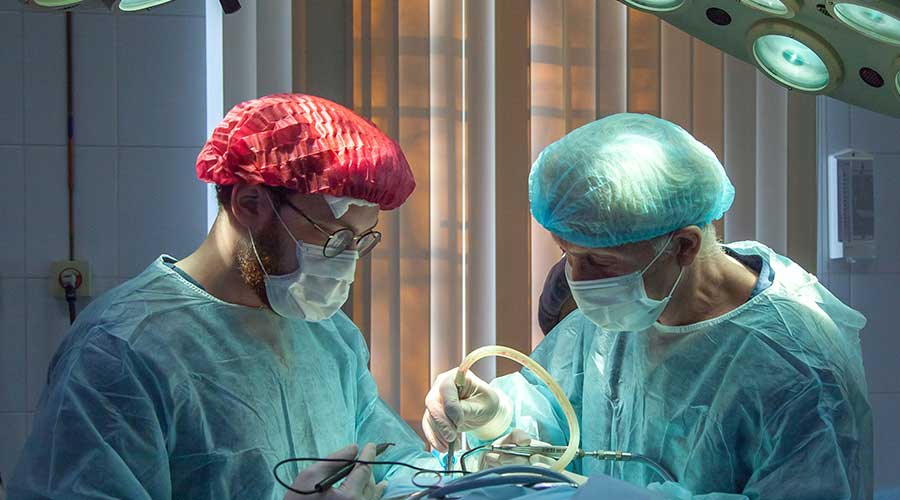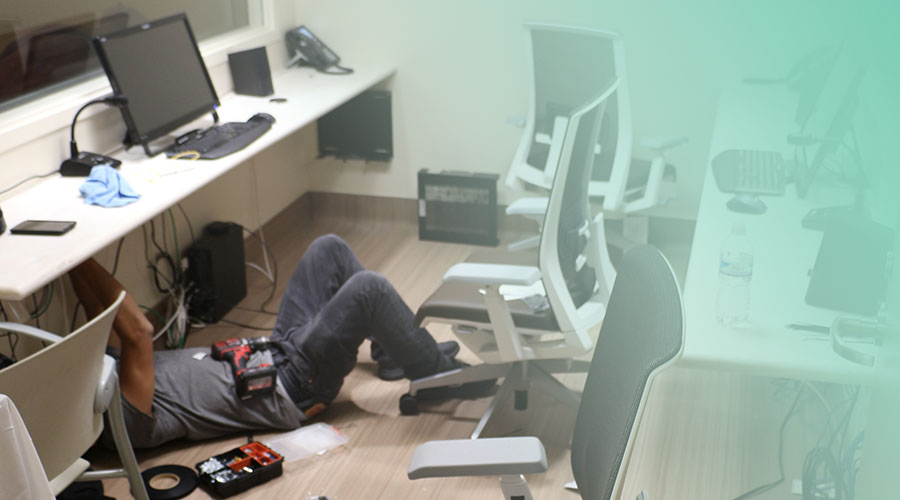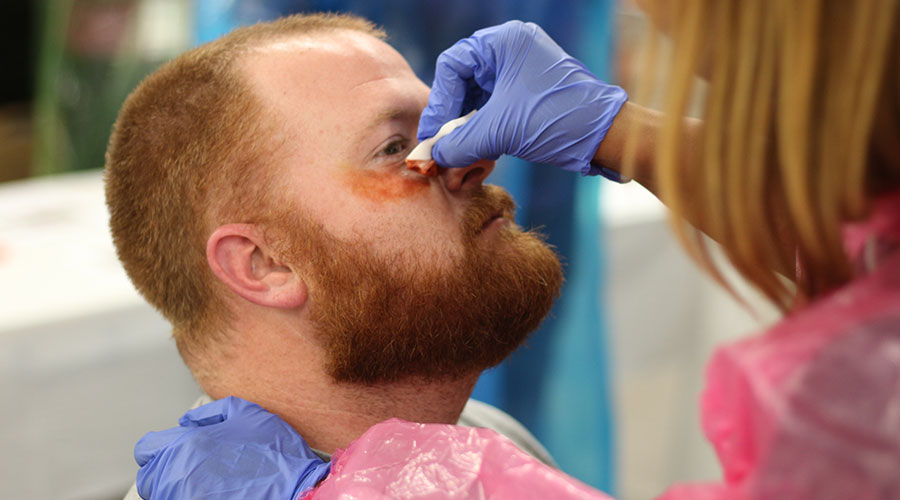A HYBRID VIRTUAL SOLUTION OFFERS A SIMULATION EXPERIENCE WITH BOTH IN-PERSON AND REMOTE COMPONENTS
Our last blog about healthcare simulation discussed augmented patient simulation solutions, which offer medical students a 100% remote option to complete simulation-based education and training. In today’s blog, we’re going to explore another option for remote medical simulation. As we enter 2021, educators and training schools in Miami, FL, and around the country continue to seek remote solutions that provide students the experience they need while reducing the risk of spreading the coronavirus through in-person classes.
The value of simulation for medicine and healthcare education is undeniable. Keep reading to learn more about a hybrid virtual solution that includes in-person and remote components and how your students can benefit from this type of simulation-based learning.
on Tuesday, 29 December 2020.
Posted in Simulation Training, Miami, FL, Simulation Training
KEEP YOUR SIMULATION LAB OPERATING EFFICIENTLY BY INVESTING IN QUALITY AV, TRAINING AND ON-GOING SUPPORT
A medical simulation lab is a huge investment for your teaching hospital, medical school or training center. Healthcare simulations are invaluable teaching tools that offer medical students the chance to gain hands-on skills and interpersonal training in a safe, controlled environment. And when it’s time for your facility to plan and budget for a medical simulation setup, you want to make sure you’re getting the most bang for your buck.
First, we highly recommend calling Level 3 Audiovisual. Most simulation projects require separate vendors for hardware, software, IT and a simulation consultant. Level 3 Audiovisual is the only end-to-end provider who delivers on all four components to build custom healthcare simulation labs for clients in Miami, FL, and across the U.S.
Second, we recommend taking the time to evaluate your primary needs and end goals for this project. All simulation labs have custom needs, and you may need to make design choices based on your budget, space availability and other concerns. As you’re planning your project, we’d like to focus your attention on three priority areas worth a higher-end investment: AV installation, simulation training, and on-going support. Keep reading to learn more.
on Thursday, 29 October 2020.
Posted in Simulation Training, Miami, FL, Simulation Training
THIS CERTIFICATION CAN BE A CAREER BOOST FOR SIM TECHS
As a healthcare simulation professional, your focus is providing training opportunities for healthcare students and professionals that will ultimately help them improve patient outcomes, and that takes a lot of different types of equipment. There are healthcare technologies such as manikins and vital sign monitors. There are AV technologies such as displays, cameras, speakers, and microphones. And much of that technology must interface with a larger IT network. Managing all those technologies and requirements, however, can take a sim tech’s focus away from running successful trainings, especially if you are unfamiliar with some of the tools in your healthcare simulation center. For example, an EMT-turned-sim tech will be familiar with medical terminology and equipment, but might be completely lost when it comes to running the AV equipment that is a critical part of every healthcare simulation center. AV industry certifications such as the Certified Technology Specialist™ (CTS®) program can help sim techs round out their skill set and provide more comprehensive service to their healthcare simulation centers.
on Wednesday, 06 November 2019.
Posted in Medical Simulation Training, Simulation Training
IMPROVE TRANSPORTATION INFRASTRUCTURE WITH THE RIGHT VISUALIZATION TOOLS
Seeing is believing, the old saying goes. But when it comes to visualizing existing data and simulated scenarios in order to address complicated infrastructure issues—such as transportation, mobility, and traffic—users need to see both real-time and historical data presented in a compelling way. And it needs to be displayed using audiovisual tools that enhance rather than detract from the information, making it easier to understand and act on. Here are three transportation challenges simulation can help address, and three AV tools that can improve the visualization of those simulations and the data they produce.
on Tuesday, 20 August 2019.
Posted in Simulation Training
For many careers and professions there is a clear path to get from where you are to where you want to be. If you want to be an engineer, you get an engineering degree. If you want to be a doctor, you go to medical school. But if you want to be a simulation technician or simulation operations specialist, the way forward is a little less clear. There is no standardized degree, certification, or educational path for simulation specialists, and people come to simulation from a variety of backgrounds including nursing, emergency response, IT, and administration.
on Tuesday, 20 August 2019.
Posted in Medical Simulation Training, Simulation Training
No two healthcare simulation labs are exactly the same, but many sim techs face similar challenges. In the recent webinar, “15 Challenges in Healthcare Simulation and How to Conquer Them,” the simulation experts at Level 3 Audiovisual discussed the most common challenges and offered solutions to address them. You can catch up on the first five challenges here. For a recap of the next set of challenges presented in the webinar, keep reading.
on Monday, 08 July 2019.
Posted in Healthcare Simulation, Simulation Training
WHY EVERY SIMULATION CENTER NEEDS AN AV EXPERT
Take a look at the job description for a simulation technician and your head might start to spin. From programming vital signs to setting up scenarios to managing inventory to applying moulage, there are lots of skills sim techs need. But understanding how to operate and troubleshoot the audiovisual system is one of the most important skills a sim tech needs to keep a simulation center running smoothly.
on Friday, 07 June 2019.
Posted in Healthcare Simulation, Simulation Training
Just like cheesy special effects can ruin a superhero movie, unrealistic wounds and symptoms can ruin a healthcare simulation scenario. Healthcare simulation training is the gold standard for improving both clinical competence and patient outcomes, but it works best if the scenario seems real. Moulage—special effects makeup for simulation—enhances the realism of your simulation scenarios and provides visual cues for diagnosis and treatment. And, luckily, you don’t need a movie studio special effects department to create it. Keep reading for hacks and tips to create realistic moulage on a budget.
on Tuesday, 28 May 2019.
Posted in Medical Simulation Training, Simulation Training
 Exploring Remote Options for Simulation-Based Education: A Hybrid Solution
Exploring Remote Options for Simulation-Based Education: A Hybrid Solution 







